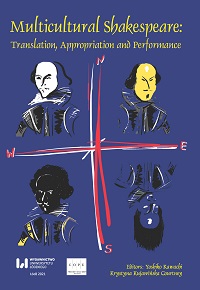Superhero Shakespeare in Golden Age Comics
DOI:
https://doi.org/10.18778/2083-8530.24.09Keywords:
Shakespeare, Superhero, Superpowers, Posthuman, Classics Illustrated, Stories by Famous Authors IllustratedAbstract
Albert Lewis Kanter launched Classic Comics in 1941, a series of comic books that retold classic literature for a young audience. Five of Shakespeare’s celebrated plays appear in the collection. The popularity of Classics Illustrated encouraged Seaboard Publishing to issue a competitive brand, Stories by Famous Authors Illustrated (1949-51), which retold three Shakespearean dramas. Although both these enterprises aimed to reinforce a humanist perspective of education based on Western literature, the classic comics belie a Posthuman aesthetic by presenting Shakespearean characters in scenes and postures that recall Golden Age superheroes. By examining the Shakespearean covers of Classic Illustrated and Stories by Famous Authors, this essay explores how Shakespearean characters are reimagined as Superhuman in strength and power.
Downloads
References
Arnaudo, Marco. The Myth of the Superhero. Baltimore, MD: The Johns Hopkins University Press, 2010.
Google Scholar
Beam, Alex. A Great Idea at the Time: The Rise, Fall, and Curious Afterlife of the Great Books. New York: Public Affairs, 2008.
Google Scholar
Benton, Mike. The Comic Book in America: An Illustrated History. Dallas, TX: Taylor Publishing Company, 1989.
Google Scholar
Bevington, David. Ed. The Complete Works of Shakespeare. Sixth edition. New York: Pearson, 2009.
Google Scholar
Bradley, A.C. Shakespearean Tragedy: Lectures on Hamlet, Othello, King Lear, Macbeth. London: Macmillan and Co., 1922.
Google Scholar
Braidotti, Rosi. The Posthuman. Cambridge: Polity Press, 2013.
Google Scholar
Cocca, Carolyn. Superwoman: Gender, Power, and Representation. New York and London: Bloomsbury, 2016.
Google Scholar
DOI: https://doi.org/10.5040/9781501316609
Coogan, Peter. “The Hero Defines the Genre, the Genre Defines the Hero,” in What is a Superhero? Ed. Robin S. Rosenberg and Peter Coogan. Oxford: Oxford University Press, 2013.
Google Scholar
Croom, Alexandra. Roman Clothing and Fashion. The Hill, Stroud, England: Amberley, 2012. n.p. https://www.cuttersguide.com/pdf/References/Alexandra-Croom-Roman-Clothing-a.pdf Accessed 23 August 2021.
Google Scholar
Currie, Elizabeth. Ed. A Cultural History of Dress and Fashion in the Renaissance. London: Bloomsbury, 2017 https://doi.org/10.1017/S2753906700002102
Google Scholar
DOI: https://doi.org/10.5040/9781474206419
D’Amato, Raffaele and Graham Sumner, Arms and Armour of the Imperial Roman Soldier: From Marius to Commodus, 112 BC–AD 192. London: Frontline Books, 2009.
Google Scholar
Day, Clarence. The Story of the Yale University Press as Told by a Friend. New Haven: Yale University Press, 1920.
Google Scholar
Fingeroth, Danny. Superman on the Couch: What Superheroes Really Tell us about Ourselves and Our Society. New York and London: Continuum, 2004.
Google Scholar
Foss, Chris, Jonathan W. Gray, and Zach Whalen, eds. Disability in Comic Books and Graphic Novels. Houndsmill, Basingstoke, Hampshire, England: Palgrave Macmillan, 2017.
Google Scholar
DOI: https://doi.org/10.1057/9781137501110
Gabilliet, Jean Paul. Of Comics and Men: A Cultural History of American Comic Books. Trans. Bart Beaty and Nick Nguyen. Oxford, MS: University Press, of Mississippi, 2010.
Google Scholar
DOI: https://doi.org/10.14325/mississippi/9781604732672.001.0001
“Hamlet.” Classics Illustrated. #99. New York: Gilberton Company, Inc., 1952.
Google Scholar
“Hamlet.” Famous Authors Illustrated, #08. Bridgeport, Conn.: Seaboard Publishers, Inc., 1950.
Google Scholar
Haslem, Wendy, Elizabeth MacFarland, and Sarah Richardson, eds., Superhero Bodies: Identity, Materiality, Transformation. New York: Routledge, 2019.
Google Scholar
DOI: https://doi.org/10.4324/9780429022289
Horace, Satires, Epistles, and ArsPoetica. Trans. Henry Rushton Fairclough. Cambridge, MA: Harvard University Press, 1926. 479.
Google Scholar
DOI: https://doi.org/10.4159/DLCL.horace-satires.1926
Jeffery, Scott. The Posthuman Body in Superhero Comics: Human, Superhuman, Transhuman, Post/Human. New York: Palgrave Macmillan, 2016.
Google Scholar
DOI: https://doi.org/10.1057/978-1-137-54950-1
Jensen, Michael P. “The Comic Book Shakespeare.” The Shakespeare Newsletter. 56:3, No. 270, Winter 2006-07.
Google Scholar
Jones, William B. Jones, Jr., Classics Illustrated: A Cultural History, second edition. 2011; Jefferson, NC: MacFarland & Company, Inc., 2017.
Google Scholar
“Julius Caesar.” Classics Illustrated. #68. New York: Gilberton Company, Inc., 1950.
Google Scholar
Kovacs, George and C. W. Marshall. Eds. Classics and Comics. Oxford: Oxford University Press, 2011.
Google Scholar
“Kryptonite,” https://www.thefreedictionary.com/ Cryptonite. Accessed 30 August 2021.
Google Scholar
Lepore, Jill. The Secret History of Wonder Woman. New York: Alfred A. Knopf, 2014.
Google Scholar
“Macbeth.” Classics Illustrated, #128. New York: Gilberton Company, Inc., 1955.
Google Scholar
“Macbeth.” Stories by Famous Authors Illustrated, #6. Bridgeport, Conn., Seaboard Publishers, Inc., 1950.
Google Scholar
“A Midsummer Night’s Dream.” Classics Illustrated, #87.1969; New York: Gilberton Company, 1951.
Google Scholar
Oxford English Dictionary (OED,) “Post-human,” https://www.oed.com.cyrano.ucmo.edu/view/Entry/263433?redirectedFrom=posthuman#eid Accessed 30 August 2021.
Google Scholar
Regalado, Aldo, J. Bending Steel: Modernity and the American Superhero. Oxford: MS: University Press of Mississippi, 2015.
Google Scholar
DOI: https://doi.org/10.14325/mississippi/9781628462210.001.0001
“Romeo and Juliet.” Classics Illustrated, #134. New York: Gilberton Company, Inc., 1956.
Google Scholar
“Romeo and Juliet.” Famous Authors Illustrated, #10. Bridgeport, Conn.: Famous Authors, Inc. Formerly Seaboard Publishers, Inc., 1950.
Google Scholar
“The Scarlett Pimpernel,” Stories by Famous Authors Illustrated, #01. New York: Seaboard Publishing, 1950.
Google Scholar
Smith, Scott Thomas and José Alaniz, Eds. Uncanny Bodies: Superhero Comics and Disability. University Park, PA: The Pennsylvania State University Press, 2019.
Google Scholar
DOI: https://doi.org/10.1515/9780271086323
“The Three Musketeers.” Classics Illustrated, #01. New York: Gilberton Company, Inc. 1941.
Google Scholar
Wandtke, Terrence R. The Meaning of Superhero Comics. Jefferson NC and London: McFarland and Company, Inc., 2012.
Google Scholar
Weldon, Glen. Superman: The Unauthorized Biography. Hoboken, NJ.: Wiley, 2013.
Google Scholar
Wertham, Fredrick. Seduction of the Innocent. New York and Toronto: Rinehart & Company, Inc., 1953.
Google Scholar
Downloads
Published
How to Cite
Issue
Section
License

This work is licensed under a Creative Commons Attribution-NonCommercial-NoDerivatives 4.0 International License.












